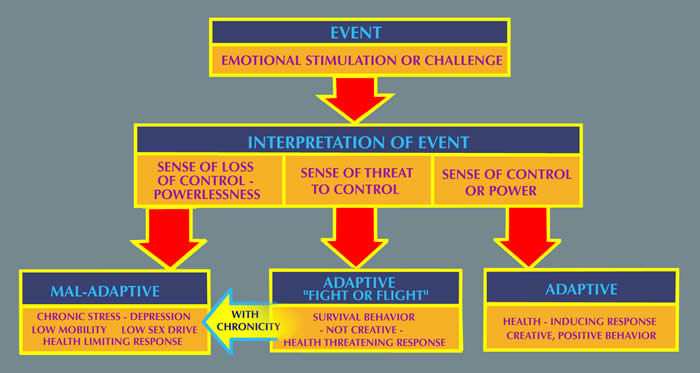| |
|
 |


The relationship between emotional stress and parafunctional behaviors (clenching, bruxism) has long been recognized. Some have considered stress to be the primary cause of bruxism. Although emotional stress can clearly increase parafunctional activity in at least some individuals, the effects of stress on the body and on symptoms of TMDs is a more complex picture.
In 1936, Hans Selye first described the General Adaptation Syndrome, explaining how the body responds to the perception of stress. Selye stated that when there was a perception of potential environmental demand (the alarm stage), the adrenal glands produced excess levels of a hormone called cortisol that prepared the body to respond, the so-called “fight – flight response”. Assuming that the threat is overcome, the stress hormones return to normal. However, if the threat persists, the continued production of the stress hormones has a detrimental effect. With chronicity, these can include irritable bowel syndrome, hypertension, certain cardiac arrhythmia disorders, asthma, and an in increase in the tonicity of the head and neck musculature. More recent research has shown that this response by the body is a very complex biochemical process.
We have stated that it is the perception of a demand that produces a stress response. How a situation is perceived can vary greatly among different individuals. There are two factors that influence this response. The first involves how much of a demand is perceived in the situation. But equally important is the perception of how much control the individual feels they have in the situation.

Research has shown that situations over which a person perceives that they have limited control produce the greatest stress response. Financial worries, dissatisfaction with a job or other responsibilities, feeling overwhelmed by circumstances, lack of job security, unhappy relationships, etc., are some examples of stress-producing situations.
Whether or not a patient demonstrates evidence of clenching or bruxing their teeth, the effects of stress in their life can cause a great deal of tension in the masticatory muscles, as well as other muscles of the head and neck, due to the biochemical response that directly affects the musculature. When other causes of muscle tension, such as dental occlusal factors or pain from the TM joints, this biochemical effect has the potential of an additive stimulus to muscular tension and symptoms.

|
|





